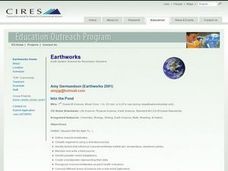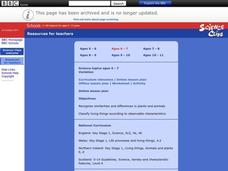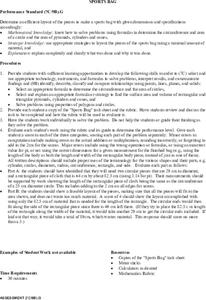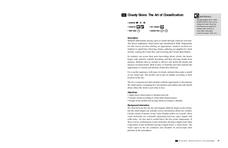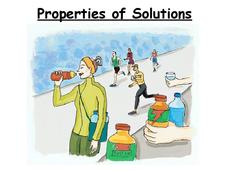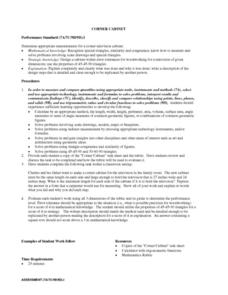Curated OER
Oobleck
Students incorporate within this lesson scientific observations, senses: touch, sound, smell and sight, classification, states of matter and surface tension. Students make a substance and use scientific observations, as well as their...
Curated OER
Science: Liquid Matter
Second graders examine the properties of liquids and their classifications. They compare and contrast cups of different liquids and record their findings in journals. Students observe how liquids flow at various speeds and that unlike...
Curated OER
Particulate Matter in the Air
Students conduct an inquiry exploring the different kinds of particulate matter in the air. They name three different types of particulate matter found in the air and identify different types of solid particulate matter found in the air...
Curated OER
Yellow Pod
Students use appropriate skills to design and conduct scientific investigation. They sort and classify various ingredients and analyze their investigation. Finally, students describe the observable states of matter, bot solids and liquids.
Curated OER
Houses
Third graders use a number of problem solving strategies in this unit of lessons. They determine how to draw and model three-dimensional objects, use co-ordinate systems, determine probability of events, and identify paths of simple...
Curated OER
Activity # 13 Float or Sink?
Students have seen that solids, which are more dense than a liquid, that sinks in that liquid and solids, which are less dense than a liquid, that floats on that liquid. They use a metal boat to float in water. Pupils comprehend that...
Curated OER
Into the Pond
Seventh graders use a pond to explore macroinvertebrates and other organisms. They use a dichotomous key to classify the organisms and maintain a journal recording their findings.
Curated OER
Pyramid Play
Students investigate the concept of the Food Pyramid. They use a game as a tool of discovery in order to classify different types of food in the pyramid. Upon completion of the game the students construct their own models of it.
Curated OER
How Do You Know There is Air in a Bag?
Fourth graders explore air as a material substance. Through experimentation and discussion, they explore how air can be classified as a material substance. Students write three examples proving that air is a material substance in their...
Curated OER
Variation
Learners participate in an online lesson to reinforce the similarities and differences in plants and animals. They classify living things according to observable characteristics.
Curated OER
Recycling
Students discuss the pros and cons of recycling on the environment. They sort and classify objects for recycling and write a brief narrative about the experience. This lesson is intended for students acquiring English.
Curated OER
3-D Figures Part 2
Students work with three dimensional objects. In this geometry lesson, students examine models of spheres, cones, cubes, prisms, and pyramids, and identify them by their edges, vertices, and faces.
Curated OER
Sports Bag
Students determine an efficient layout of the pattern pieces needed to make a sports bag with given dimensions and specifications. Given a word problem, data set and a diagram, students evaluate the information they have available and...
Granite School District
Kindergarten CCSS Math Vocabulary Word List
Help kindergartners develop the academic language they need to master the Common Core standards with this list of math vocabulary. Including the definitions of each term as well as a set of word cards with supporting images and examples,...
Bekshire Museum
Cloudy Skies: The Art of Classification
Such a great resource and perfect for learners in Kindergarten through third grade. The class will discuss cloud types and formation, and then they'll get outside and draw as they observe the clouds they see. They'll need to take note of...
American Chemical Society
Temperature Changes in Dissolving
Alia-Seltzer tablets cause a very obvious chemical change, but do they also cause a temperature change? Each class member explores hot/cold packs, discussing how these temperature changes occur. Groups then design and carry out their own...
Curated OER
Oobleck
Here is a good lesson which aptly describes how to do the classic "Oobleck" lab with your young scientists. Unfortunately, the "Oobleck Investigation Sheet" in the plan doesn't open. However, this is a very clear description about how to...
Curated OER
Classification of Matter
This is a great instructional activity with an infographic to assist your high schoolers in categorizing matter into mixtures and non-mixtures. Information is given about the metric system of measurement. Your young students match 13...
Shodor Education Foundation
Sets and the Venn Diagram (Beginner)
Venn diagrams are helpful in understanding the idea of a set and using attributes to sort items. This basic plan is an introduction with an added bonus of an applet that can be used to demonstrate the activity. If a classroom of...
Science Geek
Properties of Solutions
Study the properties of solutions as they relate to mixtures. The slide show presents the key concepts involved with solutions including solvents, solutes, solubility, and electrolytes. Scholars learn the basics of the properties of...
Curated OER
8.4 Section Review ~ Polar Bonds and Molecules
A very neat worksheet has been produced by Pearson Education, Inc. for use in a general chemistry class. The first nine questions are fill in the blanks for a paragraph about types of bonds and electronegativity. Five true-false...
Curated OER
CORNER CABINET
Ninth and tenth graders calculate the length, width, height, perimeter, area, volume, surface area, angle measures or sums of angle measures of common geometric figures. They solve problems involving scale drawings, models, maps or...
Curated OER
Melting the Ice: Energy Transfer
Learners study thermal energy and energy transfer to sea ice processes. In this energy transfer instructional activity, students make their own ice cream and discuss energy transfer and thermal energy. Learners view a radiation overhead...
Curated OER
Supplementary, Complementary, and Vertical Angles
By using circles that they cut out and label themselves, learners literally "get a grip" on the angles they identify: supplementary, complementary, and vertical. They solve missing measurements based on properties of supplementary,...








